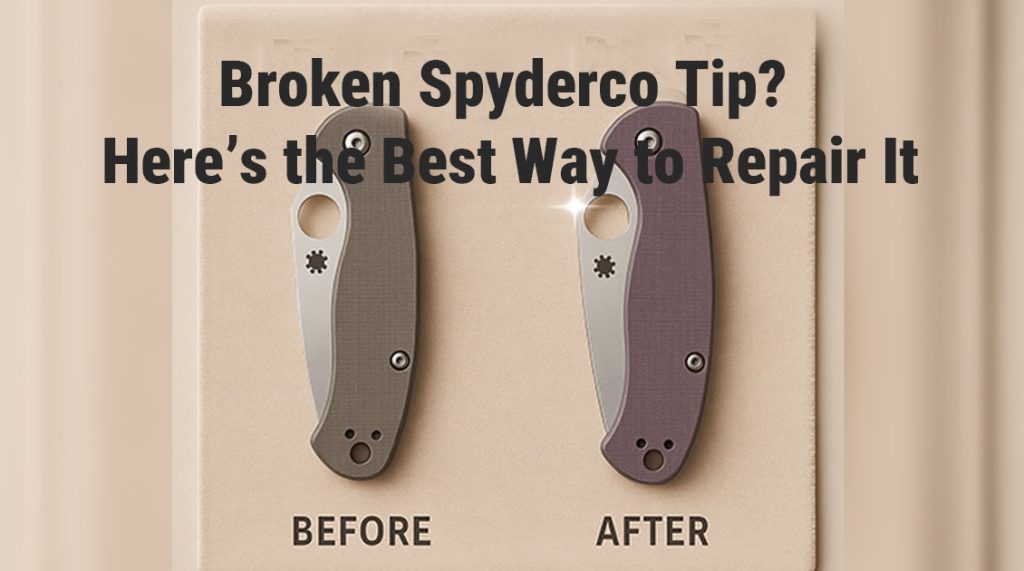Broken Spyderco Tip? Here’s the Best Way to Repair It

This is the 26th blog of the Spyderco blog series. You can check the other blogs I wrote from here – https://spydercoparts.com/blogs
Author: Logan M. Fraser
Occupation: Custom Knife Modder & Spyderco Parts Specialist
Location: Calgary, Alberta, Canada
A broken Spyderco tip is one of the most common issues knife users bring to me—and it’s also one of the most misunderstood. Whether you dropped it, pried with it, or it just snapped during regular use, don’t worry. This guide walks you through how to assess, repair, or re-profile a broken tip the right way.
Having modded and repaired hundreds of Spydercos over the past decade, I’ve seen just about every way a tip can break—and more importantly, how to fix it without ruining the knife’s balance, function, or aesthetic.
Why Spyderco Tips Break 
Spyderco blades are known for their fine geometry and slicey profiles—especially on models like the Para 3 or Delica. This precision makes them excellent cutters but more prone to tip breakage if misused.
Common reasons for breakage:
Using the tip to pry (don’t do it)
Dropping the knife onto a hard surface
Hitting bone or metal while cutting
Repeated lateral stress on fine-pointed blades
Even the best steel can snap under the wrong conditions. Knowing what happened helps guide your repair.
Option 1: Reprofiling the Tip 
If you’ve lost just the very end (2–4mm), you can reshape the tip without sacrificing too much blade length.
Tools You’ll Need:
Diamond sharpening stone or belt grinder
Fine ceramic stone for finish
Permanent marker (to track grind line)
Ruler and clamp (optional but helpful)
Steps:
Mark the current edge with a marker so you can track your progress.
Carefully grind the spine down at a shallow angle until the tip is restored.
Blend the new tip back into the existing blade shape gradually.
Use fine stones to refine and polish the new tip.

If you’re new to blade reprofiling, BladeForums has a solid discussion on this topic: https://bladeforums.com
Option 2: Custom Tip Reshape 
For more significant damage (say, over 5mm loss), consider reimagining the blade shape slightly. You can turn a broken tip into a:
Wharncliffe for utility cuts
Tanto for a tougher edge
Modified drop point for strength
This is where a pro modder (like myself) can help. I regularly reshape tips to make a damaged knife look and cut better than the original.
If you’re not confident doing it yourself, I take custom jobs through https://spydercoparts.com. Just send me a photo and I’ll walk you through the options—no pressure to buy.
Option 3: Blade Replacement 
Some breaks are too severe, or the model too valuable, to risk a DIY reshape. Spyderco doesn’t sell replacement blades—but luckily, the modding community does.
Check out:
Aftermarket blade makers on forums and Etsy
Modding services (including mine) that source OEM or custom-ground blades
Knife groups like r/knifeclub and r/spyderco on Reddit for swap opportunities
Be sure the new blade is model-specific and compatible with your handle and lock type.
Upgrades to Consider During Repair 
While you’ve got the knife apart, it’s a great time to add a few upgrades:
Custom screws and hardware: Adds style and better corrosion resistance
Upgraded washers or bearings: Smooth out your action
New clip: Deep carry or left-hand swap
Browse https://spydercoparts.com for Spyderco-compatible parts. I only carry pieces I personally use, like phosphor bronze washers and precision-fit titanium screws.
Best Practices to Prevent Tip Damage 
Once your knife is fixed, let’s keep it that way. Here are some prevention tips:
Never use your knife to pry, poke, or chisel
Use a dedicated tool for scraping
Cut on appropriate surfaces (no metal or ceramic)
Clean and oil your blade regularly
Treat your knife with the same care you give your car—it’ll last for years.
My Repair Kit List 
Want to fix your Spyderco at home? Here’s what I use:
DMT Diamond Stones for shaping – https://dmtsharp.com
KME or Work Sharp systems for edge consistency – https://worksharptools.com
Magnifying loupe to inspect damage
Small bench vise or clamp for safe grinding
Calipers to check for blade symmetry
It’s worth investing in quality gear—it pays off in cleaner results and less frustration.
Real Talk: Can You Just Ignore the Broken Tip? 
Yes, but you’ll lose a lot of utility. The tip is often the most-used part of a blade—for detail cuts, piercing, package opening, and food prep. Leaving it broken is like driving with a flat tire—it technically works, but it’s not right.
If the break is minor and doesn’t interfere with your usage, you can live with it. But why settle when you can fix it properly?
Wrapping Up: A Broken Tip Isn’t the End of the Knife 
It might feel like you’ve ruined your blade, but I promise—a broken tip can almost always be repaired, reshaped, or upgraded. Whether you choose to DIY or send it to someone like me, you’re keeping your Spyderco alive.
Got a question about your knife tip or want help identifying what to do? Drop a comment below. I’ll get back to you personally.
Let me know what you want to see next week—sharpening myths, lanyard tricks, or modding tips?




